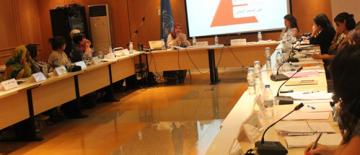
The Expert Group Meeting (EGM) held by ESCWA on the innovative approaches for promoting women’s political participation in the region gathered leading experts in political sciences and gender issues representing a number of universities, institutes, national committees and international institutions in addition to a number of UN organizations and specialized agencies.
The Meeting took place on 16-17 October 2012 at the ESCWA headquarters in Beirut and was opened by the ESCWA Centre for Women’s Director Mehrinaz El Awady who said that the Meeting was intended to discuss the draft of the study ESCWA was preparing on the innovative approaches for promoting women’s political participation. She noted that the main goal of the study was to provide a full review of women’s political participation before and after the Arab uprisings and to analyze the factors contributing curbing this participation. El Awady also reviewed the process followed for a study before publishing it.
Despite the fact that women make up nearly half of the society in Arab countries, and despite their efficient participation, not only in the popular movement two years ago, but throughout history, they were often excluded from decision-making when targets were reached. Women are partners in struggle only, but when there is transition to real change, the importance of women›s role and its efficiency diminishes under the influence of traditional culture and societal norms.
The issue of women›s political empowerment and particularly their representation in elected assemblies (Parliament and municipal councils) is a key indicator of societies’ development in general, and of political development, in particular. However, a contemplative look to the results of the parliamentary elections, which took place in the wake of the popular movement, is sufficient testimony to the parliamentary representation of women, at best, does not correspond with women’s presence in Arab societies.
The fact that the status of women in public and political life does not only collide with only legal and legislative impediments, but it also faces rigid political framings and regulations, as well as negative cultural outlooks that govern actual behaviors and practices, which need to have guarantees for a fair women representation in elected assemblies that reflect the importance of their role in the community, through both, running on party lists and as independents.





